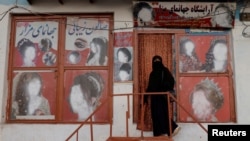A panel of United Nations experts is calling for the international community to officially recognize "gender apartheid" as a crime against humanity, highlighting the severe oppression of women and girls under regimes like the Taliban in Afghanistan.
The five-member group of experts from the United States, China, Mexico, Uganda and Serbia, affiliated with the U.N. human rights body, say this recognition is already long overdue.
“Gender apartheid is not merely a theoretical possibility or legal construct but a real threat and lived reality for millions of women and girls around the world — a reality that is currently not explicitly codified in international law,” the experts said in a U.N. statement on Tuesday.
Drawing attention to Afghanistan as a stark example, the experts claim the de facto Taliban government has institutionalized a system of gender-based “discrimination, oppression, and domination.”
Since seizing power, the Taliban have barred women and girls from secondary education, most workplaces, many recreational activities and unaccompanied travel over longer distances.
“State laws, policies and practices that relegate women to conditions of extreme inequality and oppression, with the intent of effectively extinguishing their human rights, reflect the very core of apartheid systems,” the U.N. experts said.
They urge the U.N.'s General Assembly Sixth Committee to consider adding gender apartheid under Article 2, which addresses the prevention and punishment of crimes against humanity.
Over the past year, several human rights groups and women’s rights activists have made similar calls, urging the international community to take action against the Taliban’s repressive policies.
“Adapted from the international law on racial apartheid, ‘gender apartheid’ emphasizes that discrimination has been made the system of governance itself,” Karima Bennoune, a professor of international law at the University of Michigan Law School, wrote in comments to VOA.
“Afghan women human rights defenders stress that the Taliban are not simply failing to uphold women’s rights — oppression of women is central to their system of governance and a core part of their philosophy,” Bennoune said.
Despite a lack of international recognition and terrorism sanctions, Taliban authorities defend their gender-based restrictions as rooted in Islamic and traditional values.





